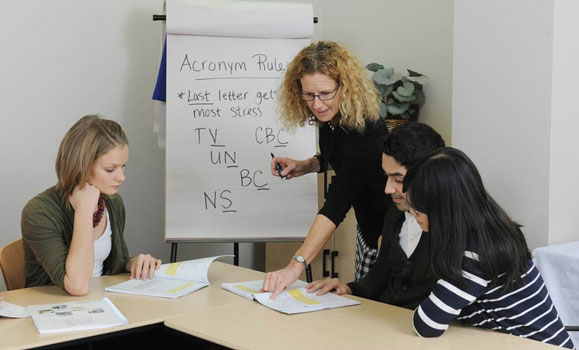News
» Go to news mainAccent Modification Clinic: Overcoming Communications Barriers

Every person has an accent, and these accents can be an important part of who we are and where we come from. However, accents can also lead to difficulty communicating with others.
One year ago, Dalhousie’s School of Human Communication Disorders launched the Accent Modification Clinic to help individuals challenged by communication barriers as a result of their accent. The goal is “not to eliminate someone’s natural accent,” according to Cindy Dobbelsteyn, a speech and language pathologist with the clinic, but “to increase their confidence and their ability to be understood.”
Typical Clients and Tailored Programs
The clinic attracts a variety of people interested in altering their speech and “there is no typical client,” says Dobbelsteyn. From international students and residents of Halifax to actors who wish to change the way they speak for a role, the diversity of the patrons provides unique challenges for the Clinic, which tailors the program to the needs of each individual.
“People from different language backgrounds will have different needs,” says Dobbelsteyn. “And that’s why at the outset we do an in-depth assessment.” After the assessment – which is audio recorded – Dobbelsteyn spends a lot of time listening to the client’s speech to pinpoint problem areas and designs a program to reflect those needs.
Changing Communications Habits
“The longer you’ve been speaking a certain way, the harder it is to change,” says Dobbelsteyn. Participants generally take 12 weeks to complete the program, which gives them an awareness of areas they need to work on in their communication and tools designed to help.
It’s up to each individual to practice the skills they’ve learned in order to see the most improvement. Altering speech takes a lot of practice and Dobbelsteyn recommends an “hour a day for optimal success.”
Feedback
Lucinda, an accounting student at Dal, heard about the clinic through an international students’ support group. She was initially hesitant to participate in the program for financial reasons, but thanks to one-time funding from the Faculty of Health Professions specifically for students, she was able to attend.
When she first started the program, Lucinda struggled with pronouncing vowels. Although she had started learning English in primary school, she says at that time she “had little interest in practicing” and found it boring. Now that she is living and studying in Canada, Lucinda is paying a lot more attention to her English skills.
Attending the clinic has given Lucinda more confidence in her speaking abilities. Previously, she had difficulty understanding some of her Canadian friends “because they talk so fast,” but now when she talks to her friend from Ontario, Lucinda says, “I understand every word.”
Lucinda explained that it’s the “small things that have been changed” in her pronunciation that make all the difference.
Many others who have attended the clinic express similar results. Through assessments done after completion of the program and written feedback, the clinic is able to measure its impact.
‘Post’ assessments show that participants have experienced “significant improvements in identifying spoken components of English,” says Dobbelsteyn. Every participant has said that they have benefited from the program and the assessments have shown that participants are “more able to identify components of spoken English that they weren’t previously able to identify.”
Looking To the Future
As the international population in Halifax continues to grow, the clinic hopes to increase its popularity.
According to Dobbelsteyn, “cost is a barrier, particularly for the international students,” but she is thankful for the funding from the Faculty of Health Professions and Dal student services which provided one-time support for students wishing to attend the clinic this year.
With awareness of the clinic’s offerings increasing and an ever-growing international presence within the Halifax community, the Accent Modification clinic is well positioned to continue to help clients improve their English communications skills.
Want to know more about the clinic and its services? Visit the Accent Modification Clinic website.
Recent News
- Master of Health Administration grad continuing cancer research in PhD in Health program
- SWAB‑Rx study aims to expand sexual health services in pharmacies
- Master of Science in Occupational Therapy grad passionate about sustainability in health‑care
- MSc (Rehabilitation Research) grad explores passion for science communication
- The science of winning: Dal Health professor guides Canada’s Olympic athletes to peak mental performance
- Respiratory Therapy grad makes impact in field, cultivates her joy in healthcare during undergraduate education
- Healthcare’s unsung heroes: Recognizing and celebrating the importance of clinical instructors
- Master of Health Administration grad explores passion for health care and technological advancement
